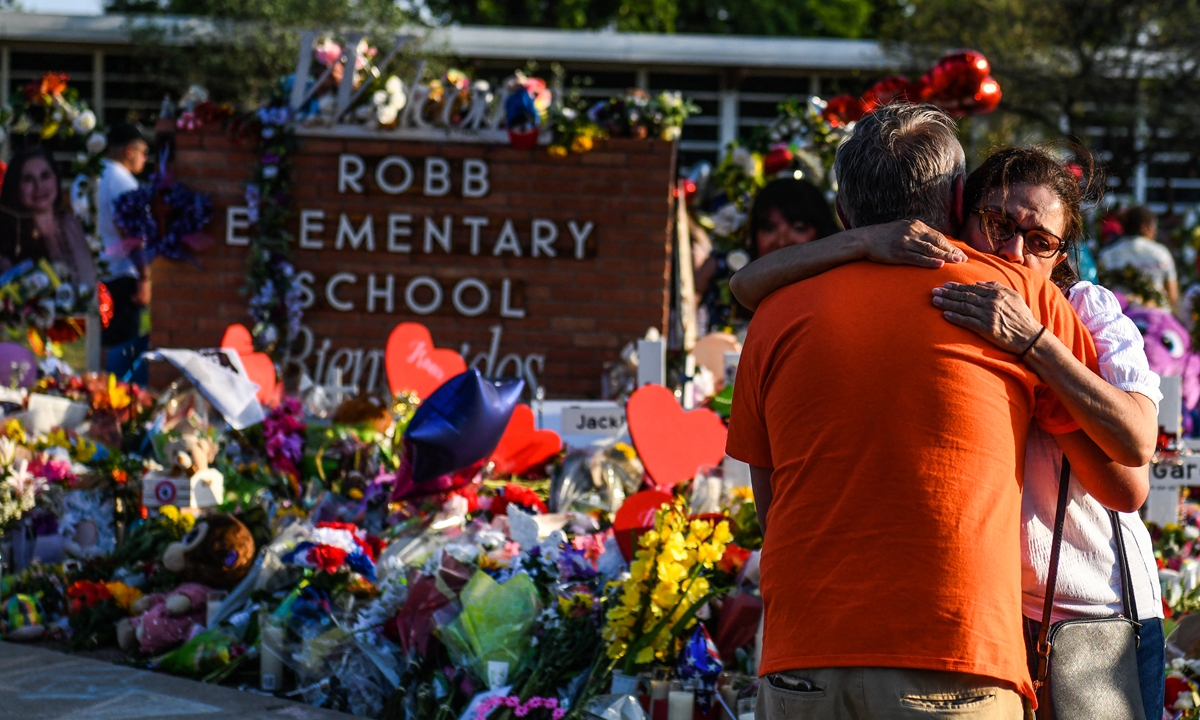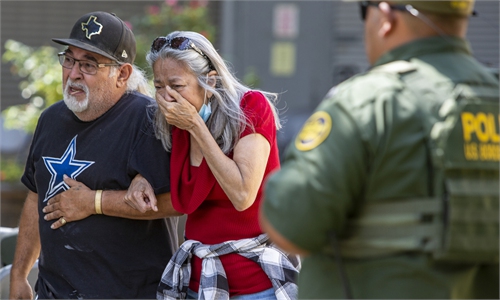
A woman cries at a makeshift memorial at Robb Elementary School in Uvalde, Texas, on May 30, 2022.Photo:AFP
A new investigation into "the deadliest school shooting in Texas history" - the shocking mass shooting at an elementary school in Uvalde, Texas, on May 24 - was released Sunday. The most painful detail revealed in the report is that nearly 400 law enforcement officers rushed to the school after receiving reports. Despite that, they still could not stop the mass shooting by an 18-year-old gunman, leading to the tragic deaths of 19 students and two teachers.The report claims that the investigative committee didn't find any "villains" in this horrifying massacre. "There is no one to whom we can attribute malice or ill motives. Instead, we found systemic failures and egregious poor decision making," it further explains.
It is utterly ridiculous that US law enforcement officers of that considerable amount couldn't even protect the children who need protection the most from harm. This is more of a systemic crime than simply "systemic failures." And how can a country that can't even protect its own children have the courage to call itself a "human rights defender"?
Lü Xiang, a research fellow of the American Institute at the Chinese Academy of Social Sciences (CAS), told the Global Times that the Sunday report reveals the chaos in US law enforcement and a declining enforcement capacity. However, it didn't touch on the so-called systemic defects in US law enforcement, nor was there any reflection on the system, said the scholar.
The so-called systemic failures are, in fact, the consequences of Washington's systemic problems, including the inability to institute gun control and end institutional racism.
The US is a country that suffers significantly from gun proliferation. A 2018 report shows that US civilians own almost 400 million guns, more than the whole US population of that year. Against such a backdrop, US police officers have to worry about possible gun violence from others, especially what they see as suspects. Therefore, they are highly likely to use guns when they feel such threats.
Data from Gun Violence Archive shows that as of July 16, there have been 352 mass shootings in the US this year. On average, 1.8 shootings occurred every day in the "land of the free." At this rate, this year's number is likely to exceed that of last year, which was 692.
In contrast to the poor US law enforcement shown in the Uvalde mass shooting, the country's law enforcement officers have excessive use of force against racial and ethnic minorities, especially African Americans. For example, Jayland Walker, a 25-year-old black man, was killed last month at the hands of police in Ohio, with a preliminary autopsy report finding at least 46 gunshot wounds and 26 bullets in his body.
From George Floyd to Jayland Walker, all these cases highlight the systemic racism entrenched in US law enforcement. A US report released in May revealed that African Americans as a community are at least four times more likely to be killed by gunshots than the total US population and 12 times more likely than white people.
Various social and economic problems in the US continue to worsen due to the increasing political polarization. According to Wei Nanzhi, another scholar from the CAS, these problems will make the US society more torn and can easily provoke massive discontent. But the division actually benefits the rule of the US elite, and violence and conflicts can help release a certain amount of public pressure and dissatisfaction. Therefore, the US only "seeks to manage the crisis rather than solve it," the expert explains.
On the other hand, Lü argues that the problems within the US system are more likely to worsen. "From the White House to the Supreme Court, it is evident that the ability of most US elite is decreasing. In the short to medium term, I think the situation in the US will become even worse," he noted.
In the face of out-of-control gun violence and unsolvable, deep-seated problems in US governance, it is doubtful that the US law enforcement officers can still protect people in the country.

